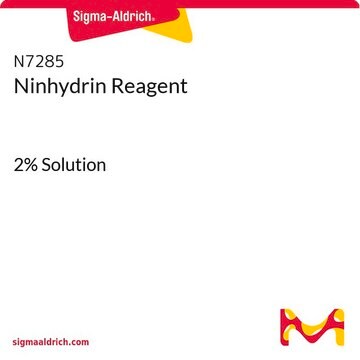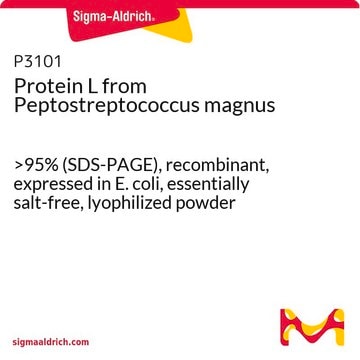F9015
Fluorescamine
≥98% (TLC), powder, used for detection of primary amines
Synonym(s):
4-Phenylspiro-[furan-2(3H),1-phthalan]-3,3′-dione
About This Item
Recommended Products
Assay
≥98% (TLC)
form
powder
color
off-white to yellow
mp
153-157 °C (lit.)
solubility
acetone: 50 mg/mL
storage temp.
room temp
SMILES string
O=C1OC2(OC=C(C2=O)c3ccccc3)c4ccccc14
InChI
1S/C17H10O4/c18-15-13(11-6-2-1-3-7-11)10-20-17(15)14-9-5-4-8-12(14)16(19)21-17/h1-10H
InChI key
ZFKJVJIDPQDDFY-UHFFFAOYSA-N
Looking for similar products? Visit Product Comparison Guide
General description
Application
Storage Class Code
11 - Combustible Solids
WGK
WGK 3
Flash Point(F)
Not applicable
Flash Point(C)
Not applicable
Personal Protective Equipment
Certificates of Analysis (COA)
Search for Certificates of Analysis (COA) by entering the products Lot/Batch Number. Lot and Batch Numbers can be found on a product’s label following the words ‘Lot’ or ‘Batch’.
Already Own This Product?
Find documentation for the products that you have recently purchased in the Document Library.
Customers Also Viewed
Articles
Thin-layer chromatography method for detecting organic impurities in valacyclovir, an antiviral medication, following USP monograph guidelines.
Thin-layer chromatography method for detecting organic impurities in valacyclovir, an antiviral medication, following USP monograph guidelines.
Thin-layer chromatography method for detecting organic impurities in valacyclovir, an antiviral medication, following USP monograph guidelines.
Thin-layer chromatography method for detecting organic impurities in valacyclovir, an antiviral medication, following USP monograph guidelines.
Our team of scientists has experience in all areas of research including Life Science, Material Science, Chemical Synthesis, Chromatography, Analytical and many others.
Contact Technical Service







